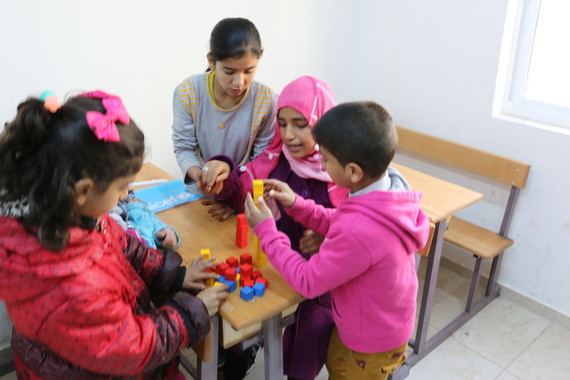In 1960 the three Mirabal sisters, political activists in the Dominican Republic, were brutally murdered. Since 1981 activists have marked that day, 25th November, as a day for speaking out against violence against women and girls (VAWG). This year the date will mark 16 Days of Activism against Gender Based Violence (GBV), aiming to raise awareness - amongst men, women, boys and girls of all ages and abilities - and mobilise communities everywhere to bring about transformative change.
The theme for this year is "From peace in the Home to Peace in the World - Make education safe for all" . The theme echoes the saying of Omar ibn Al Khattab "acquire knowledge and learn tranquillity and dignity" ; access to safe and quality education for all is essential if we are to promote the dignity and wellbeing of individuals, families and communities.
Today, 66 million girls are missing out on education and a high proportion of them are disabled at a time when education has the power to transform their lives, the lives of people around them and the communities i which they live.
The first command given to the Prophet Muhammed (PBUH) and his followers from God was "Iqra" which means read. It implies the concept of learning, exploring and seeking enlightenment, which is demonstrated in Islamic history. Women were at the forefront of advancing various fields of learning including Islam, science, and established charitable, educational and religious institutions: Zubayda bint Ja'far al Mansur pioneered in the ambitious project of the construction of wells and service stations along the pilgrimage route from Baghdad to Mecca; Sutayta Al-Mahāmali was a famous mathematician; Dhayta Khatun excelled in management and statesmanship; Fatima el Fehri founded the Qarawiyin mosque in Fez Morocco - the first university in the world; and the engineer Mariam Al Ijiliya made astrolabes in Aleppo. The prominence of such educated women in the history of Islam ignites my passion to use my privilege and power to promote the education of all girls and to do my part to break the barriers they face in accessing quality education.
Education is a human right for all children - for boys and girls of all ages and abilities. It is recognised in the Universal Declaration of Human Rights, and is a principle agreed by many governments. Education is key to social development but unfortunately a number of challenges, cultural norms and practices have resulted in the low access to education for millions of children, particularly girls and young women. One of these barriers is the presence of Gender Based Violence (GBV) in and around school.
Girls with disabilities are disproportionately more likely to experience violence while entrenched assumptions about girls and women roles in the household influence perceptions, devaluing girl's education. For too many girls, pregnancy caused by early marriage means the end of their education alongside other life changes over which they have no control. We cannot ignore the reality - lack of interventions supporting girls in education will perpetuate gender inequality.
Access to education is not enough. To ensure girls of all abilities receive the empowering and transformational experience that education can offer, teachers need to be trained, supported and motivated, alongside building a culture in school that condemns GBV.
GBV is not inevitable, and prevention is possible. Prevention is essential.
The Sustainable Development Goals include specific targets on Gender Equality to end GBV as a human rights violation, violations that continue to be a global pandemic . Tackling GBV sits alongside the fourth Sustainable Development Goal which seeks to ensure inclusive and equitable quality education for all boys and girls, of all abilities. These SDGs offer huge promise, but must be adequately funded if we are to bring real change to the lives of women and girls. This global initiative provides us with an opportunity to advance innovation with the clear aim of increasing access to education for girls, and enabling us to retain them in the classroom.
Men and boys, in their roles as grandfather and father, son and brother, peers and mentors, teachers and principals, or the CEO of an iNGO, can support efforts to cultivate a school culture and community environment that condemns GBV and promotes the value of women and girls. This is a call to action on violence against women and girls, join me and others uniting our visions and voices to convince, inspires and demands for a transformative change

